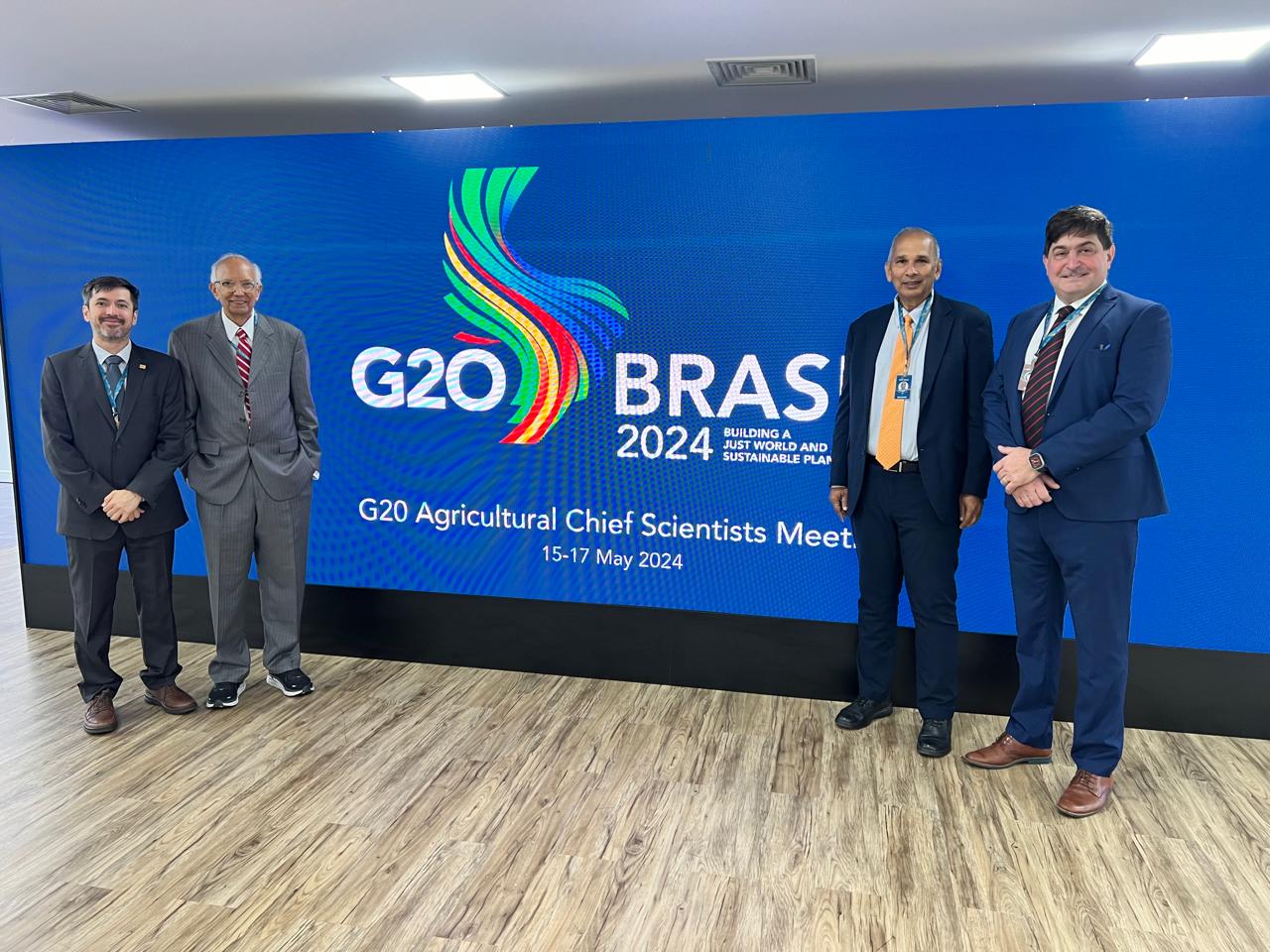IICA was invited by the Brazilian presidency to participate in the G20 Global Initiative on Bioeconomy meetings that began this month. The mission of these meetings is to agree on High-Level Principles on Bioeconomy, which will be included in the Rio Declaration to be adopted by the Heads of State and Government at the end of the year.

Brasilia, 20 May 2024 (IICA) – Agriculture must contribute to mitigating climate change and creating solutions for the other environmental challenges faced by the planet, while also ensuring global food and nutrition security and contributing to the achievement of the Sustainable Development Goals (SDGs), stated scientist Rattan Lal, a world-renowned authority in soil science and Goodwill Ambassador of the Inter-American Institute for Cooperation on Agriculture (IICA), at a G20 meeting.
The G20, or Group of Twenty, which brings together the world’s largest economies, is the main global forum for economic, social, and political cooperation. This year, the presidency is held by Brazil, one of the member countries of the Americas, along with Argentina, Canada, the United States, and Mexico.
Due to its recognized leadership in transforming agriculture toward greater productivity and sustainability in the Western Hemisphere, IICA was invited to participate in the Meeting of Agricultural Chief Scientists (MACS) in Brasilia.
This G20 working group brings together ministers and senior agriculture officials from the member countries, along with technical cooperation and research organizations, to collect information on the sector’s resources, capabilities, and infrastructure and to discuss its future.
IICA was also invited by the Brazilian presidency to participate in the G20 Global Initiative on Bioeconomy meetings that began this month. The mission of these meetings is to agree on High-Level Principles on Bioeconomy, which will be included in the Rio Declaration to be adopted by Heads of State and Government at the end of the year.
In addition to Professor Rattan Lal, who co-leads the Living Soils of the Americas Initiative with IICA, the Institute was represented at the MACS meeting in Brasilia by the Director of Technical Cooperation, Muhammad Ibrahim.
With the support of Brazil’s Minister of Agriculture and Livestock, the meeting was organized by the Brazilian Agricultural Research Corporation (EMBRAPA), a public institution that for more than 50 years has been developing technologies, knowledge, and information for the sector in this South American country, playing a decisive role in its productivity growth.
Silvia Massruhá, President of EMBRAPA, was one of the speakers at the meeting of agricultural scientific leaders, where she explained that science, technology, and innovation are essential for the development of sustainable agricultural practices.
Massruhá highlighted EMBRAPA’s work in boosting Brazil’s productivity over the past decades but warned that “none of this would have been possible without the support of nearly five million rural producers across the country”.
Also present at the meeting was Deissy Martínez Barón, a researcher on agriculture and climate change from the CGIAR food security research consortium and the Bioversity International-CIAT Alliance, who described the latest global scientific advances in sustaining food security and adapting to global warming.
Participants also visited Embrapa Cerrados, a unit established to showcase the different ways of tackling the challenge of sustainable agriculture in the Cerrado biome, the epicenter of Brazil’s agricultural growth.
Producing more with less
In his presentation, Lal pointed out that agriculture must meet the demands of a growing global population, estimated to reach 10 billion people by 2050, without using more resources—primarily land and water—than it does today.
“We must move towards eco-intensification, which involves producing more with less land and ensuring more food per unit of water, and per unit of fertilizers, pesticides, and energy used, while also generating lower greenhouse gas emissions”, he specified.
Lal provided a detailed explanation of the practices that should be promoted to maintain soil health, which not only enhances productivity but also increases carbon sequestration efficiency, thus making agriculture a tool for mitigating climate change.
The scientist, who won the 2020 World Food Prize, also announced at the G20 the launch of the Living Soils of Africa initiative, thanks to an agreement between the Alliance for a Green Revolution in Africa (AGRA) and IICA. The program aims to restore degraded lands and improve climate resilience in African agrifood systems, similar to the Living Soils in the Americas program, which Rattan Lal and IICA have been leading since 2020.
“Famines, like wars, are man-made tragedies. We must make them politically intolerable, morally toxic, ethically unthinkable, and humanly unacceptable. To achieve this, globally restoring soil health must be part of the solution”, he asserted.
Muhammad Ibrahim, IICA’s Director of Technical Cooperation, expressed the organization’s solidarity with the victims of the devastating floods in the Brazilian state of Rio Grande do Sul, which demonstrate the destructive impact of climate change.
Ibrahim explained that IICA provides its 34 Member States with technical cooperation to stimulate innovation and the adoption of technologies that enhance climate resilience. It works in areas such as adaptation, biotechnology, bioeconomy, biofuels, digitalization, soil carbon sequestration, water use and management, capacity building to combat pests and diseases, and trade.
“The transformation of agrifood systems”, Ibrahim pointed out, “requires a systemic approach. IICA works to support countries in developing a new generation of policies that emphasize family farming and the need to present science-based information so that agriculture becomes part of the solution to climate change and thrives on practices that enhance its resilience”.
More information:
Institutional Communication Division.
comunicacion.institucional@iica.int











